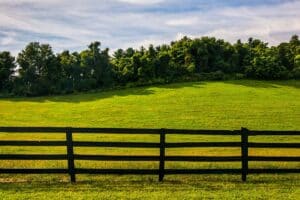Pat Porter is driving around Southeast Texas, looking at some tracts of land that were purchased by an investment group represented by RecLand Realty. The tracts the group purchased all have different types of access- access, no access, or questionable access. Land agents specializing in rural real estate deal with land access issues all the time, so Pat takes a few minutes to inform buyers in search of rural land for sale about four scenarios for accessing tracts of rural land:
- Deeded, legal access to a public road
- No access, but legal access can be acquired
- Physical access route, but it is not deeded
- Landlocked, no road, easement or deeded access
The tract Pat is on his way to look at fits scenario number two- it doesn’t have legal deeded access but it can be acquired fairly easy. Gaining legal access requires a process and a check, but it can be done. In this case, the plan is to gain legal access through a timber company via an old haul road leading to the property. Access to the property will be granted through an easement, at a cost per foot, plus administrative and surveying costs totaling several thousand dollars for the owners. The property is approximately 80 acres, and the distance for the access is short. In the end, the owners will have a legal, deeded 30-foot-wide easement to access the 80 acre property. Investing several thousand dollars to gain legal access made sense for the owners.
The tract Pat just left, has public road access. The property fronts a county road in Jasper County, Texas, and is easily accessed by turning off the county road. Legal deeded access is the best access a rural land owner can have.
Some potential buyers will not consider purchasing a property if it does not have legal deeded access- regardless of the price of the property. Most people don’t want to buy a problem, and sellers getting ready to list their land for sale should keep this in mind. Pat advises that sellers who have an access issue with their property should consider having it resolved before listing the property for sale. Otherwise, they run the risk of turning off about 85% of would-be buyers.
The third type of access scenario has a physical road leading to it but there is no guaranteed or legal right of use to the road. This is a scenario land agents encounter often in rural real estate, when people buy property located off a road that is owned or maintained by a large timber company. Typically, this road can be used by anyone for access to the property. While the timber company might not grant legal access for use by others, the road has been traditionally used to access the tract. People that are used to buying and selling land are not scared of land with this type of access. They can use the road for access to the land for hunting, timber harvesting, and enjoyment of the property.
The issues with the third scenario is that most banks will not lend money on a property that does not have legal deeded access. If someone wants to buy property without legal access, it usually has to be a cash deal, but it could still present a problem to potential owners if they choose to sell the property in the future.
The fourth scenario has no legal deeded easement, no trail leading to it, and is out in the middle of nowhere. Some of the property owned by the group of investors is “landlocked” and falls into this category, and he is working on a solution. Pat and the group are having to deal with owners of the property between the state/county road and the tract, trying to figure out who owns what, and approach them to try and buy an access. If and when the owners are granted an easement, the access road still needs to be developed. This process costs money and requires a lot of thought and preparation to make sure it’s done right.
Each state is different regarding their laws for access to land tracts. If you have a question about access to a property you own or that you’re thinking about buying, talk to professionals and seek legal advice.
This content may not be used or reproduced in any manner whatsoever, in part or in whole, without written permission of LANDTHINK. Use of this content without permission is a violation of federal copyright law. The articles, posts, comments, opinions and information provided by LANDTHINK are for informational and research purposes only and DOES NOT substitute or coincide with the advice of an attorney, accountant, real estate broker or any other licensed real estate professional. LANDTHINK strongly advises visitors and readers to seek their own professional guidance and advice related to buying, investing in or selling real estate.









Add Comment